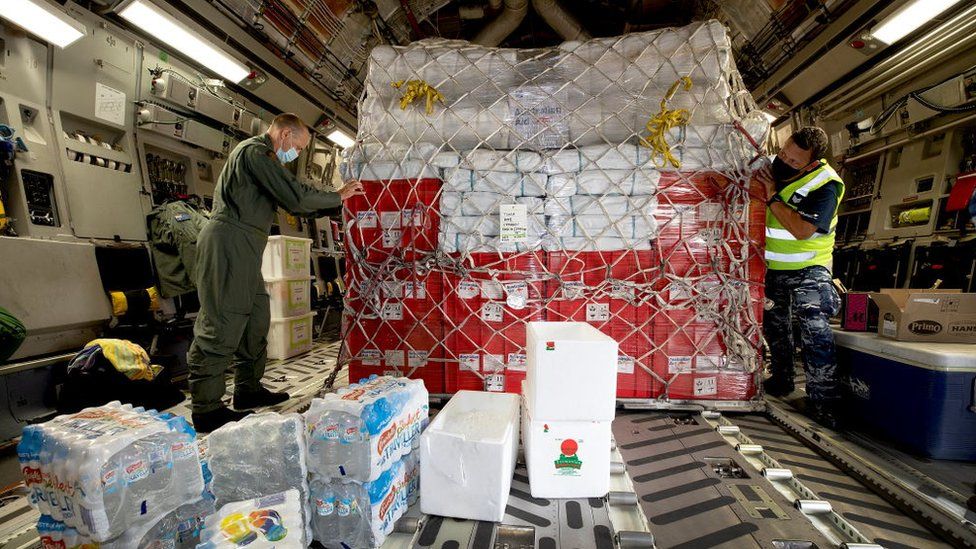Humanitarian efforts to bring aid to Tonga following Saturday’s volcanic eruption and tsunami are being complicated by the need to protect the country from coronavirus.
The South Pacific island nation is effectively Covid-free, with just one case of infection reported, last October, and the government is determined to keep it that way.
So the authorities have stressed the need for aid to be delivered in a contactless way to avoid bringing in the virus.
What is contactless aid?
“In Tonga, emergency provisions are being sent in but personnel are not and strict Covid protocols are followed on delivery,” Aaron Davy, of the Council for International Development, in New Zealand, says.
“Even when working on the broken communication cable out at sea, the work is being done without personal contact with local people.”
Aid agencies also provide assistance remotely – such as coordination expertise – but local authorities and community groups run the response on the ground.
“We have staff and partners in country and we can plan with them and support them without entering Tonga,” Unicef’s resident coordinator for the Pacific Islands, Jonathan Veitch, says.
“We helped vaccinate the entire country, so [contactless delivery] is feasible.
“But eventually we may need some specialists in Wash (water, sanitation and hygiene) or reconstruction to go in – and then we will need to sort out safe quarantine measures with the government.”

Has it been done before?
Yes, there have been a number of non-contact operations in the region during the pandemic.
New Zealand delivered vaccines to Pacific Island nations by naval ship, then on helicopters or inflatable boats, before handing them over to teams on land at a distance.
Strict safety protocols – such as the wearing of protective clothing – avoided any possible transmission.
Crew members also received special training on how to handle the vaccine boxes when transferring them.
Contactless methods were also used to distribute relief supplies to Vanuatu, in the aftermath of Cyclone Harold, in April 2020.
Foreign aid workers were banned from entering the country and aircraft flew in humanitarian supplies that had been disinfected and quarantined for three days.
“Covid has forced a change in the way aid is delivered and this more localised approach is effective,” Mr Davy says.
“Not only did we avoid Covid transmission [in Vanuatu] but we were able to support them by getting resources and funds directly to the people in-country who knew how best to respond.”

Tonga’s deadly tsunami
- VOICES: Even the dogs were covered in ash – Tonga resident
- VISUAL GUIDE: How volcano’s impact spread so widely
- ANALYSIS: Scientists explain explosion’s ferocity
- VIDEO: Giant eruption captured by satellites
- HEALTH: Warnings over danger of volcanic ash

How has Tonga achieved zero-Covid?
Tonga has effectively closed its borders to international travel.
All commercial flights to Tonga are suspended and options to leave are also strictly limited.
Only Tongan citizens and permanent residents, and travellers approved by the health ministry can enter, on occasional repatriation flights, and then must be quarantined for 21 days on arrival.
Goods coming into the country also have to be quarantined.
About 60% of Tonga’s 105,000 population have been fully vaccinated.
And it has maintained strict internal restrictions since the start of the pandemic, including night-time curfews and restrictions on gatherings.

Why Tonga is so worried about Covid?
Tonga is made up of more than 170 islands and its economy relies heavily on foreign tourism.
The remoteness of some of these island communities, many with limited healthcare resources, makes them particularly vulnerable to an outbreak.
People also worry the lack of exposure to the virus means little immunity within the population.
Historical experience also plays a role.
When Spanish flu reached Tonga, a century ago, with the arrival of a ship carrying sick passengers, the infection spread rapidly.
It is estimated up to 8% of the population died as a result.
During the 18th Century, other diseases, such measles and dysentery, were also brought in by outsiders, destabilising the small island society.


























